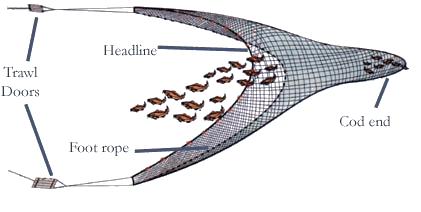
We recently discussed US fisheries biologist Ray HiIborn’s criticism of David Attenborough’s film ‘Ocean’, in which bottom trawling is portrayed as a very harmful fishing method — unjustifiably so, according to Hilborn, who claims that bottom trawling is a ‘vital method of procuring healthy protein’. [1]
Criticism also came from the industry in the UK, which claimed that Attenborough’s film ignored the progress made by the bottom trawling industry, which has ‘moved away from the destructive past’ and now ‘operates with gear designed to reduce seabed contact and mimimise bycatch’ [2]. Critics rightly point out that other industrial uses of the seabed (submarine cables, offshore wind farms, deep-sea mining, etc.) also cause damage. And the technology of bottom trawling has been improved, the industry claims. However, three problems remain. Firstly, it is questionable whether such an improvement is feasible for the majority of bottom trawlers and whether the improvements will be monitored.
How dare they the seabed in protected areas?
Secondly, the use of bottom trawls in Marine Protected Areas (MPAs) is a sign of a lack of serious fisheries management. The EU Court considers bottom trawling to be a destructive fishing practice and therefore confirms that it may not be used in MPAs [3]. Bottom trawling in MPAs was also a legal issue at the recent UN Ocean Conference (UNOC, [4]). Oceana found 20,000 hours of bottom trawling in marine protected areas in UK waters [5]. Among all the promises made at UNOC, for example, the UK announced that it would extend the ban on bottom trawling in more MPAs [6].
The fact that we have to discuss whether we should allow this ruthless technique in MPAs is a scandal. The real question is rather whether bottom trawling should be banned at all, something that many organisations have been campaigning for for years [7].
There is no such thing as animal-friendly trawling
Thirdly, even if improvements in bottom trawling may result in less damage to the environment, there is not a single idea of how to minimise the suffering of the animals in these large nets, trapped in the thousands and thousands, scrunched together in the cod end and injured by this and by barotrauma when they are hauled from the depths, with swim bladders, eyes, and intestines twisted out of their bodies. Not to mention that the animals that have survived so far are let to suffocation after being dumped on board.
From the animals‘ point of view, bottom trawls are a weapon of mass destruction designed to maximise catches without any consideration for the individuals. This technique simply leaves no possibility of alleviating the suffering of the animals. The same applies to any trawl, whether it is dragged through mid water or near the surface; the only difference to bottom trawling is that barotrauma can possibly be avoided.
In short, there are strong reasons to end bottom trawling, if not by law, than through a boycott on the market. A bunch of determined consumers can persuade retail chains to abandon fish from bottom trawls.
Title picture:
Bottom trawl (drawing by Anilocra / Wikimedia)
Sources:
[1] https://www.facebook.com/groups/think.fish/posts/1233612868317756
[2] UK fishing industry challenges Attenborough
[3] EU Court upholds protection from destructive bottom trawling in marine protected areas
[4] Legal challenge over untackled bottom-trawling in EU Marine Protected Areas
[5] Oceana reports 20,000 hours of suspected trawling in UK MPAs
[6] UK government proposes to extend ban on destructive bottom trawling; similar on BBC
[7] Seven things we learned at the UN Ocean Conference
